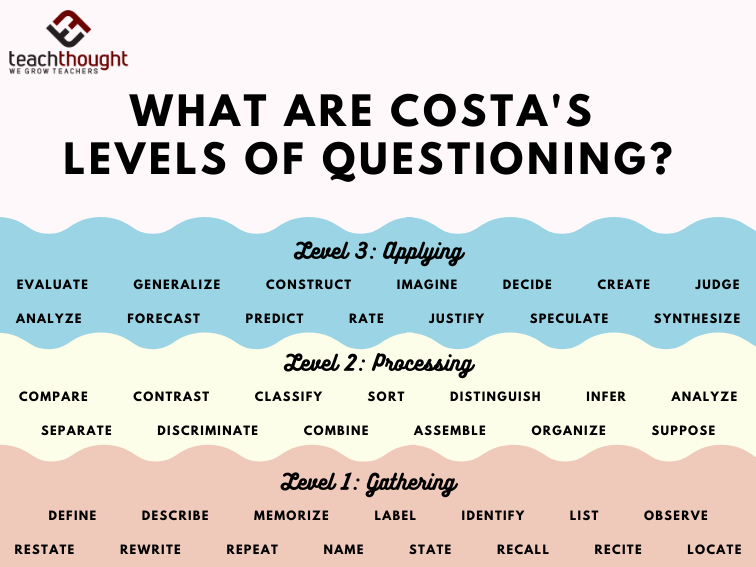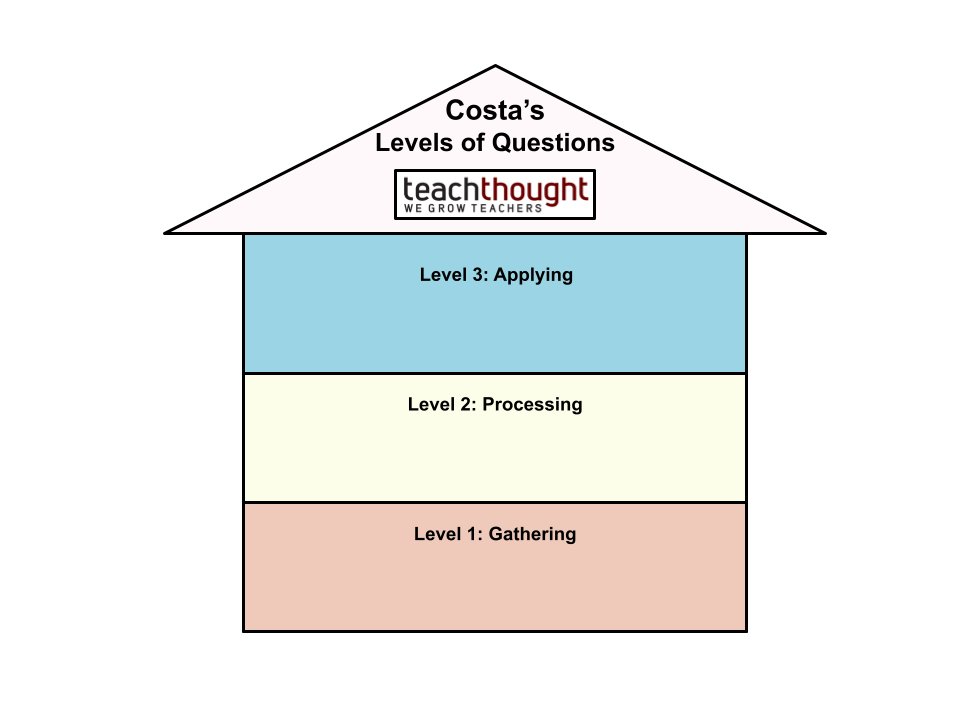

Costa’s Degrees of Examining– developed by instructional scientist Art Costa– feature 3 tiers of examining created to advertise higher-level reasoning and questions.
Similar to Blossom’s taxonomy , Costa’s lower degree triggers trainees to utilize even more standard faculties; as students go up in degrees, the inquiries prompt them to make use of more complicated reasoning abilities. Via decades of study on human resilience, Dr. Costa likewise recognized the 16 Behaviors of Mind , a set of behaviors that sustain pupils in browsing the obstacles that commonly take place in school and life, as a whole. Several of Dr. Costa’s 16 practices– thinking interdependently, introducing, gathering information, and applying previous knowledge to brand-new situations– both call for and reinforce higher degrees of doubting.
There is a substantive quantity of research that supports Dr. Costa’s schema. Newmann (1993 found that higher-order thinking compels students to “adjust information and concepts in manner ins which transform their definition,” and “anticipates pupils to fix troubles and create meaning on their own,” which aligns with a constructivist view of education and learning
Costa’s Levels of Questioning are commonly shown using the metaphor of a home with three floorings:


Level 1: Gathering
Level 1 questions primarily require pupils to deal with information ‘on the page.’ Solution to level 1 concerns are generally literal; definition, a pupil can actually point to the solution on a web page.
We’ve previously discussed Blossom’s Taxonomy power verbs , so you can forecast that Costa’s levels have their own collection of power verbs, too. Below are a few that you could find at the start of Level 1 concerns:
- Define
- Describe
- Remember
- Tag
- Identify
- Checklist
- Observe
- Reiterate
- Rewrite
- Repeat
- Name
- State
- Remember
- State
- Locate
- Select
- Match
- Show
Level 1 concerns by content location could resemble these instances:
- Scientific research : Tag the components of a pet cell.
- Mathematics : Recite the formula for finding the quantity of a cyndrical tube.
- History : Suit the name of the majesty to their particular nation.
- English Language Arts : Situate the area in the plot where the orgasm occurs.
You can see just how a lot of these Level 1 power verbs call for students to remember information, which is an essential skill in its own right. Nevertheless, educators must pursue the majority of their questions to fall in Level 2 or 3, which challenge pupils to use higher-order reasoning skills.
Level 2: Processing
Level 2 concerns go a step further than Level 1, triggering pupils to process information by ‘reading in between the lines.’ While students may need to utilize actual information to formulate their responses, Level 2 requires them to process that information with what they currently know in order to make new connections.
Here are some instances of Degree 2 power verbs:
- Compare
- Comparison
- Identify
- Sort
- Distinguish
- Presume
- Evaluate
- Different
- Discriminate
- Combine
- Assemble
- Organize
- Expect
Level 2 inquiries by material area may appear in the complying with means:
- Science : Contrast the procedures of mitosis and meiosis.
- Math : Categorize the geometric shapes according to their number of sides and angles.
- Social Studies : Construct the complying with historic occasions in the order of relevance, from many to least.
- English Language Arts : Analy ze the influence that the writer’s tone has on the general significance of the message.
Can you see exactly how Level 2 inquiries go a step better than Level 1 More than just spitting up information, learners take it and ‘do something’ with it. They classify, make differences, and compare/contrast it versus another component to see just how it impacts the whole. These sort of skills can boost interest and develop a bridge to the concerns that really create creativity and higher-level reasoning.
Degree 3: Using
While Degree 1 questions trigger pupils to deal with input, and Degree 2 concerns test them to refine that input in order to make new connections. Right here, students take part in the highest-level reasoning abilities to develop an outcome. This might result from making examinations and analyses, screening options to numerous issues, or making predictions.
We’ve included some examples of Degree 3 power verbs below:
- Evaluate
- Generalise
- Construct
- Picture
- Decide
- Develop
- Judge
- Examine
- Projection
- If/then
- Forecast
- Rate
- Validate
- Hypothesize
- Manufacture
- Build
- Assume
Degree 3 inquiries by content location may resemble the following:
- Scientific research : Based on information from the last years of storm activity in the southeast U.S., forecast how the regularity of storm activity will alter in the following 10 years.
- Math : Rate the chance of a presidential candidate winning the political election based upon safeguarding the selecting ballots from the following united state states: Florida, California, Virginia, New York City, Illinois.
- History : Produce a social compact that takes into consideration the results of globalization and technical innovation in the 21 st century.
- English Language Arts : Develop a disagreement that safeguards or refutes required staff member vaccination plans in the United States.
Whether preparing for discussion-based activities, project-based knowing, or independent query, educators ought to make every effort to orient most of pupil reasoning and interaction at Levels 2 and 3 Assessments that motivate pupils to remember basic facts (such as the date of a historical event, or the name of an author, or the formula for an equation) do not truly examine students’ capacity to use new skills or info to brand-new contexts. A Level 2 or 3 concern would test trainees to make links with basic information. For instance, instead of recalling a plain date, a much more flexible inquiry would ask pupils to predict, based on the time in background that a particular event took place, the chance of it recurring, provided a comparable sociopolitical ambience. Along the same lines, as opposed to recalling the names of famous authors, an educator might challenge students to make a debate for just how a writer would discuss a certain modern problem.
In “A Talk with Educators,” James Baldwin explained the mystery of education: “As one starts to become mindful, one begins to take a look at the society in which [they] are enlightened.” Level 2 (and primarily, level 3 inquiries intend to foster this type of response in pupils, to create them to turn their heads, do double-takes, point out disparities, disrupt the status, identify flaws in present institutions, and create innovative options for those flaws. These are the inquiries that motivate us ahead up with more questions, to think of our reasoning, and to progress– both as individuals and cultures.